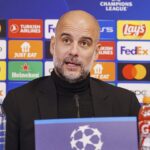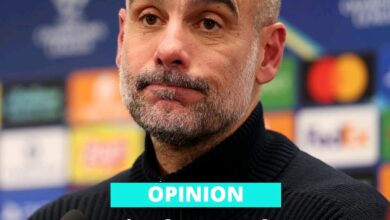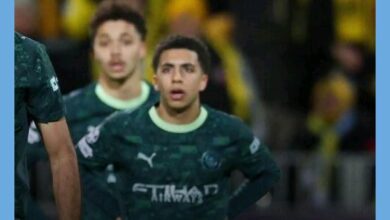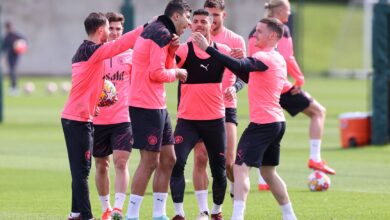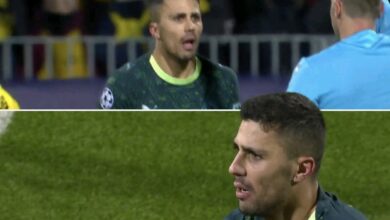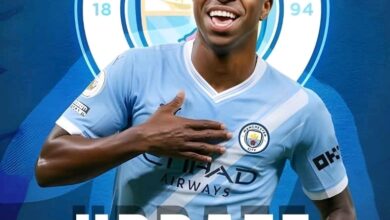Man City register interest to sign £205k-p/w PSG star who Pep called “top”
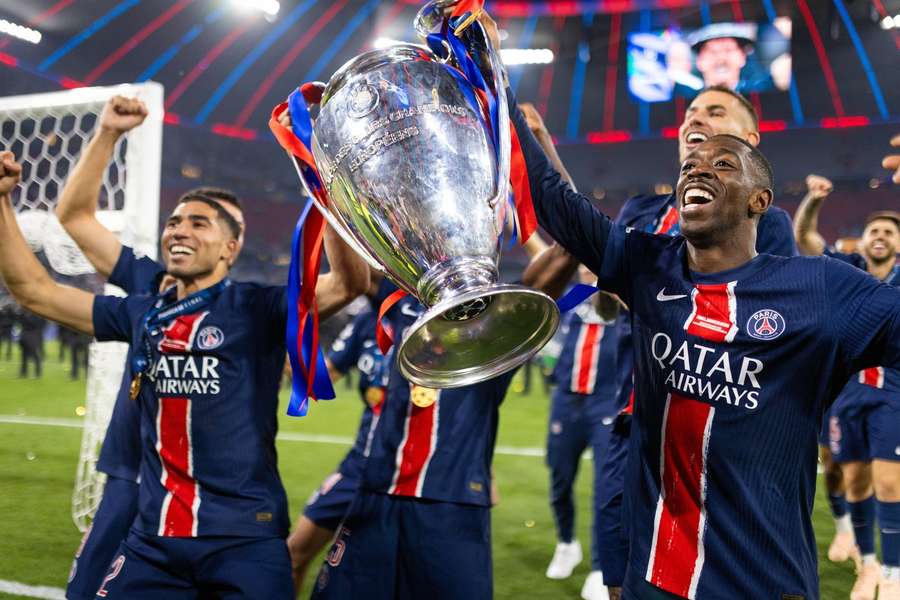
Manchester City’s recent trophyless campaign has sent shockwaves through the Etihad Stadium, marking the first time in recent memory that Pep Guardiola’s side has ended a season without silverware. This unprecedented drought has not dampened the Catalan manager’s spirits; instead, it has ignited a fierce determination to orchestrate one of the most comprehensive squad overhauls in the club’s modern history.
The Citizens’ disappointing campaign has forced a period of introspection at the highest levels of the organization. For a club that has become accustomed to dominating domestic competitions and competing at the pinnacle of European football, the absence of trophies represents more than just a statistical anomaly—it signals the end of a golden era and the urgent need for regeneration.
Guardiola, whose tenure at Manchester City has been defined by tactical innovation and consistent success, now faces perhaps his greatest challenge since arriving in 2016. The Spanish tactician has made it clear that this summer’s transfer window will be pivotal in determining whether City can reclaim their position at the summit of English and European football.
The Club World Cup: A Golden Opportunity for Redemption
The upcoming Club World Cup presents Manchester City with an immediate opportunity to atone for their recent disappointments. This expanded tournament, featuring the world’s elite clubs, offers more than just prestige—it comes with a substantial financial incentive that could reach nearly £100 million for the eventual winners.
For Manchester City, participation in the Club World Cup represents a chance to end their trophy drought while simultaneously generating the additional revenue needed to fund their ambitious summer transfer plans. The tournament’s timing perfectly aligns with the club’s need for both immediate success and long-term investment in squad renewal.
The financial windfall from a successful Club World Cup campaign would provide Guardiola and the club’s hierarchy with additional flexibility in the transfer market. While City are hardly short of funds, the extra revenue would allow for more ambitious pursuits and reduce any concerns about Financial Fair Play regulations that have occasionally constrained their spending in recent years.
The Exodus of Experience: Key Departures Reshape the Squad
The summer of 2025 is set to witness the departure of several iconic figures who have been instrumental in Manchester City’s recent success. These exits will create both challenges and opportunities as Guardiola seeks to reshape his squad for the future.
Kevin De Bruyne’s Emotional Farewell
Perhaps the most significant departure will be Kevin De Bruyne’s move to Napoli, marking the end of an era for both player and club. The Belgian midfielder’s potential exit represents the loss of arguably Manchester City’s greatest ever player—a testament to his extraordinary impact during his time at the Etihad Stadium.
De Bruyne’s influence extends far beyond his statistical contributions, impressive as they may be. His vision, creativity, and ability to produce moments of magic in crucial situations have defined City’s attacking philosophy under Guardiola. More importantly, his leadership qualities and professional standards have set the tone for the entire squad.
The void left by De Bruyne’s departure cannot be understated. His role as the primary creative force in City’s midfield has been central to their tactical approach for years. Guardiola now faces the complex challenge of not only replacing De Bruyne’s technical abilities but also finding a new leader who can command the same respect in the dressing room.
From a tactical perspective, De Bruyne’s versatility has allowed Guardiola to deploy various formations and strategies. His ability to operate as a traditional number 10, a deeper-lying playmaker, or even in wide positions has provided invaluable flexibility. Finding a direct replacement with similar versatility will be one of the summer’s greatest challenges.
Jack Grealish’s Unexpected Exit
Jack Grealish’s potential move to Tottenham Hotspur represents another significant departure, though one that perhaps reflects the natural evolution of Guardiola’s tactical preferences. Once considered one of England’s most promising attacking talents, Grealish has found himself increasingly marginalized at City, becoming what many consider a “spare part” in the squad.
Despite his reduced playing time, Grealish’s influence within the squad should not be underestimated. His experience and mentality have contributed to the culture of success that has permeated the Manchester City dressing room. The Englishman’s professionalism in dealing with reduced opportunities has set an example for younger players about maintaining standards even when not in the starting eleven.
Grealish’s departure would represent a significant financial decision for Manchester City. The substantial investment made in acquiring him from Aston Villa means that any sale would need to recoup a considerable portion of that outlay. His move to Tottenham would also strengthen a direct rival, adding another layer of complexity to the decision.
The tactical implications of Grealish’s exit are equally significant. While he may not have been a regular starter, his ability to retain possession and create chances from wide positions provided Guardiola with a valuable option for certain tactical setups. His replacement will need to offer similar qualities while potentially fitting better into City’s evolving tactical framework.
Tactical Evolution and New Acquisitions
Tijjani Reijnders: The Dutch Midfield Maestro
AC Milan’s Tijjani Reijnders has emerged as a priority target for Manchester City, representing the type of technical midfielder that perfectly fits Guardiola’s tactical philosophy. The Dutch international’s performances in Serie A have caught the attention of Europe’s elite clubs, with City now leading the race for his signature.
Reijnders’ technical ability and tactical intelligence make him an ideal candidate to help fill the void left by De Bruyne’s departure. His passing range, creativity, and ability to operate in multiple midfield roles align perfectly with Guardiola’s requirements for positional flexibility. The 25-year-old’s experience in one of Europe’s most tactically sophisticated leagues suggests he would adapt quickly to the demands of English football.
The financial aspect of the Reijnders deal reflects Manchester City’s commitment to investing in proven quality. With AC Milan likely to demand a significant fee for their prized asset, City’s willingness to pursue the transfer demonstrates their determination to maintain the highest standards in their squad reconstruction.
From a tactical perspective, Reijnders offers the versatility that Guardiola values highly. His ability to play as a traditional number 8, a deeper-lying playmaker, or even in more advanced positions provides the flexibility needed to implement various tactical approaches. This adaptability would be crucial as City adjust to life without De Bruyne’s unique skill set.
Rayan Ait-Nouri: Pace and Power on the Flanks
The potential acquisition of Rayan Ait-Nouri represents Manchester City’s desire to add pace and athleticism to their attacking options. The Wolverhampton Wanderers defender’s ability to operate as both a full-back and wing-back makes him an attractive proposition for Guardiola’s tactical system.
Ait-Nouri’s physical attributes and attacking instincts align with the modern requirements for full-backs in elite football. His pace allows him to provide consistent attacking thrust down the flanks while his defensive solidity ensures he can fulfill his primary duties. This combination of attributes makes him suitable for the demanding role of a full-back in Guardiola’s system.
The Algerian international’s age profile also fits Manchester City’s transfer strategy perfectly. At 23, he represents both immediate impact and long-term investment, capable of developing further under Guardiola’s tutelage while contributing immediately to the team’s tactical objectives.
The Goalkeeper Conundrum: Donnarumma’s Potential Arrival
Ederson’s Uncertain Future
The potential departure of Ederson to the Saudi Pro League has created an unexpected goalkeeper situation for Manchester City. The Brazilian’s possible exit for a fee of just over £25 million would represent excellent business for the Saudi clubs while creating a significant void for City to fill.
Ederson’s unique skill set has been integral to Manchester City’s tactical approach under Guardiola. His exceptional distribution and comfort with the ball at his feet have enabled City’s build-up play from the back, making him as much a playmaker as a traditional goalkeeper. Finding a suitable replacement with similar technical abilities represents a considerable challenge.
The financial aspect of Ederson’s potential departure is intriguing. While £25 million might seem modest for a goalkeeper of his caliber, it would provide additional funds for City’s other transfer activities while removing a significant salary from their wage bill.
Gianluigi Donnarumma: The Italian Stallion
Paris Saint-Germain’s Gianluigi Donnarumma has emerged as Manchester City’s primary target to replace Ederson, should the Brazilian depart for Saudi Arabia. The Italian international’s contract situation at PSG has created an opportunity for City to secure one of Europe’s premier goalkeepers.
Donnarumma’s recent Champions League triumph with PSG has only enhanced his reputation as one of the world’s finest goalkeepers. His performances throughout the tournament demonstrated his ability to perform at the highest level under pressure, a quality that would be invaluable for Manchester City’s ambitions.
The 25-year-old’s technical abilities align well with the requirements of playing for Manchester City. His distribution, though different in style from Ederson’s, is more than adequate for Guardiola’s system. His shot-stopping ability and command of his penalty area provide the foundation that any elite team requires.
Guardiola’s previous praise for Donnarumma, describing him as a “top goalkeeper” in 2017, suggests that the Spanish manager has long admired the Italian’s abilities. This historical appreciation could prove crucial in convincing Donnarumma to consider a move to the Premier League.
The contract wrangle between Donnarumma and PSG creates the perfect storm for Manchester City to make their move. The goalkeeper’s recent comments about his future—”We will see what happens… I don’t know”—suggest a player open to new challenges and opportunities.
Competition for Donnarumma’s signature is expected to be fierce, with Arsenal, Manchester United, Inter Milan, and Juventus all reportedly monitoring his situation. This level of interest reflects his status as one of the most coveted goalkeepers in world football.
From a financial perspective, Donnarumma’s reported £205,000 per week wages represent a significant but manageable investment for Manchester City. The goalkeeper’s age profile ensures that any investment would provide value over many years, making the financial commitment worthwhile.
The Broader Transfer Strategy: Building for the Future
Financial Considerations and Fair Play
Manchester City’s transfer strategy this summer must balance immediate needs with long-term sustainability. The club’s financial strength provides significant advantages in the transfer market, but the evolving landscape of Financial Fair Play regulations requires careful planning and execution.
The potential windfall from the Club World Cup, combined with revenue from player sales, would provide substantial resources for the summer transfer window. This financial flexibility allows City to pursue their primary targets without compromising their long-term financial stability.
The strategic nature of City’s potential signings reflects a mature approach to squad building. Rather than pursuing marquee names for their own sake, the club appears focused on acquiring players who fit specific tactical requirements and offer genuine improvement to the squad.
Youth Development and Squad Balance
Manchester City’s transfer strategy also reflects their commitment to maintaining an appropriate balance between experienced professionals and developing talents. The signings being pursued suggest a focus on players who can contribute immediately while offering potential for further development.
The age profiles of targets like Reijnders, Ait-Nouri, and Donnarumma indicate a strategic approach to squad building that considers both immediate needs and long-term succession planning. This methodology has served City well in recent years and appears to be guiding their current transfer activities.
Tactical Implications and System Changes
Adapting to New Personnel
The arrival of new players will inevitably require tactical adjustments from Guardiola and his coaching staff. The unique attributes of potential signings like Reijnders and Ait-Nouri suggest that City’s tactical approach may evolve to maximize their new acquisitions’ strengths.
Reijnders’ arrival could signal a shift toward a more traditional midfield setup, with clearer role definitions compared to the fluid system that has characterized City’s recent tactical approach. His technical abilities and tactical intelligence make him suitable for various roles within Guardiola’s preferred formations.
The potential addition of Ait-Nouri could provide greater attacking impetus from the flanks, allowing City to stretch opponents more effectively and create different types of attacking opportunities. His pace and directness offer tactical options that complement City’s existing attacking arsenal.
Maintaining Tactical Identity
Despite the significant personnel changes, Manchester City’s core tactical identity is unlikely to undergo dramatic transformation. Guardiola’s philosophical approach to football remains consistent, with new signings expected to adapt to existing systems rather than requiring wholesale tactical changes.
The emphasis on technical ability, tactical intelligence, and positional flexibility in City’s transfer targets suggests that the club’s playing style will remain recognizable despite the new faces. This continuity is crucial for maintaining the high standards that have defined the Guardiola era at Manchester City.
Conclusion: A Summer of Transformation
Manchester City’s approach to the summer transfer window represents more than simple squad renewal—it signifies a comprehensive transformation designed to restore the club to its position at the pinnacle of world football. The combination of high-profile departures and ambitious new signings creates the perfect conditions for regeneration and renewed success.
Guardiola’s determination to address the shortcomings of the previous season through strategic recruitment demonstrates his continued commitment to excellence at Manchester City. The targets being pursued reflect both tactical acumen and a deep understanding of the qualities required to succeed at the highest level.
The financial resources available to Manchester City, potentially boosted by Club World Cup success, provide the foundation for an ambitious summer of activity. The combination of player sales and additional revenue streams creates opportunities for significant investment in squad improvement.
As the transfer window progresses, Manchester City’s ability to secure their primary targets will determine whether this period of transition becomes a successful regeneration or a temporary setback. The early indications suggest that the club is approaching this crucial period with the seriousness and ambition that their supporters expect.
The summer of 2025 may well be remembered as the moment when Manchester City successfully navigated one of their most challenging periods, emerging stronger and more determined than ever. With Guardiola at the helm and significant resources at their disposal, the foundations are in place for another golden era at the Etihad Stadium.



